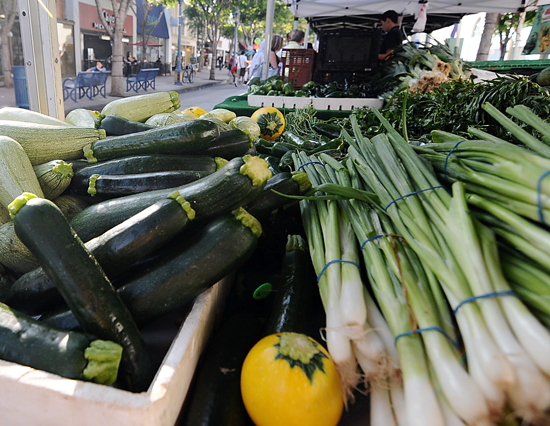Community Supported Agriculture program offers affordable organic food, helps South Central farmers

A wide variety of seasonal, organic and locally grown vegetables that are available at the Farmer’s Market in Westwood can also be delivered to customers through the Community Supported Agriculture program. The produce comes in large boxes and is a frugal way to eat right and support local growers.
By Natalie Hein
Oct. 14, 2009 11:19 p.m.
Every Wednesday evening is like my birthday. I get a big, mysterious brown box filled with goodies and I shake with excitement as I pry open its top.
As I rummage through the box’s contents ““ a cornucopia of exotic, organic produce ““ I’m six again, holding my mom’s hand as I walk down the colorful isles of the neighborhood farmers’ market (as a true foodie, the kid-in-a-candy-store adage isn’t nearly as fitting). Yet unlike other elitist organic produce, my Community Supported Agriculture box is a true steal at only $15.
Happy birthday to me!
Now, I understand that not everyone is as thrilled about fruits and vegetables as I am. But, CSA offers affordable, organic, local and seasonal produce to the proximate community as a solution to the multitude of environmental, social and equity issues that surround most food systems. Such a positive program deserves serious consideration by nutrient-starved students and non-students alike.
The CSA program in Westwood directly supports South Central farmers, who travel just an hour and a half away to work on the cooperative farm just outside of Bakersfield. One of the major environmental flaws in our current food system is the incredible distance food travels to get to our plates. Just think of the blueberries you eat in the winter that travel all the way from Chile by plane, get transported miles from a distributor to your grocery shelf via wasteful, refrigerated trucks and come delivered in copious amounts of unnecessary packaging just to top your morning yogurt. Buying from these local farms cuts way down on our food’s carbon footprint.
There’s more incentive to supporting these local farmers than just their energy-efficient location.
“I chose to work with the South Central farmers in particular because they offer really affordable produce. CSA programs are about twice as expensive elsewhere than what we pay here at UCLA because the South Central farmers have a very strong commitment to their communities,” said Shanna Gong, director of the Sustainable Resource Center, founder of the CSA program at Weyburn Terrace, and a second-year graduate student in sociology.
One of the ways in which these farmers support their local communities is by offering different pricing schemes for purchasers. You can choose to either pay the base price of $15 a box, or pay as much as $30 to buy not only a box for yourself, but one for a low-income family.
“Most of the people that purchase from them are from low-income areas. So they make their prices lower and offer us a really great value for what we’re getting. You can’t get this much produce at Whole Foods or Ralphs for this little money,” Gong said.
Not only are the boxes stuffed with a plethora of produce, but it’s also organic.
“There are a lot of health benefits,” Gong said. “We eat food all the time that has pesticides on them, and nobody knows the long-term effects of that. If you cut down on your exposure, then there should be significant health benefits. Also, the food tastes better. Conventionally grown produce grows too fast because the farmers just want to get the food out to the consumer quickly. When food grows too fast, you lose some of the flavor. So, most people recognize that organic produce tastes better.”
Because of these benefits, organic, local produce usually has a stigma that surrounds it ““ that it’s only accessible to the privileged. CSA shatters this view on sustainable food systems and emphasizes that everyone can eat fresh produce in its natural state. Now that it’s affordable, more students should be aware of and support this unique alternative to our flawed food sources.
If you’re thinking, “I don’t cook!” or “I don’t know how to cook kale, okra, chard or beets, or even know what they are!” ““ not to fear. The South Central Farmers’ CSA Web site offers a blog and recipe database that tells you exactly what’s in the box of the week and offers recipes for each vegetable. So, if you’ve ever wanted to learn how to cook and eat healthy food, this program is the greatest gateway to fresh, organic gastronomy.
My roommates and I split a box three ways every other week. That’s $5 every two weeks for an outstanding amount of food ““ a huge box, 17 inches long, 11 inches wide and 10 inches high, overflowing with produce. I cook almost every night and invite friends over to eat with us, and the produce rarely dwindles. The CSA program eradicates the “starving student” stereotype because it’s so easy to support.
You can order your box online through the SCF Web site ““
scfcoop.southcentralfarmers.com ““ pick it up at Weyburn Terrace Apartments on Wednesday evening and eat like a king for the rest of the week.
Gong emphasized that if students in a more conveniently located part of Westwood wanted to volunteer their apartment as an alternative pick-up location, the CSA program would gladly accommodate.
There’s no excuse for not using this resource. If you’ve got a kitchen and an appetite, there’s no greater deal for the buckled budget. You’d be doing your community a favor by going green and saving green, and your taste buds will appreciate the weekly gift too.
For more information on the CSA program, suggested recipes and to order a box, visit the SCF CSA’s Web site at cfcoop.southcentralfarmers.com or e-mail Hein at [email protected].
Send general comments to [email protected].


